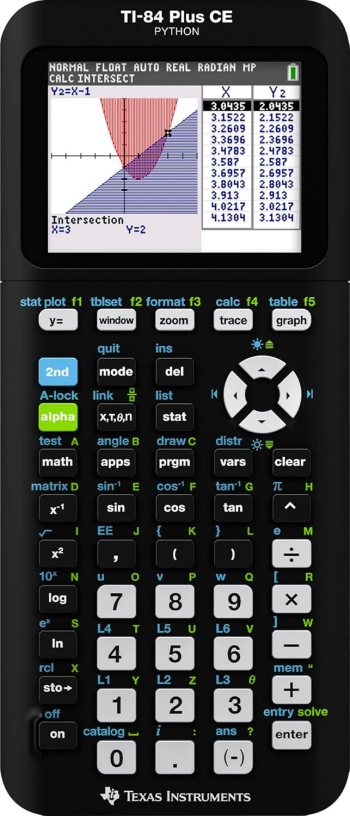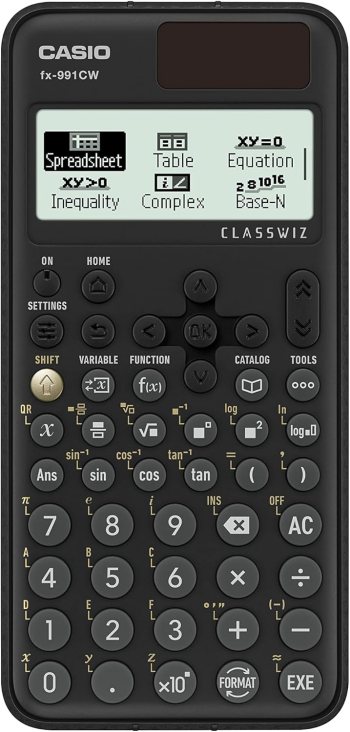- User-friendly interface
- Long battery life
- Wide range of functions
- Color display enhances readability
- User-friendly
- High-resolution display
- Extensive functionality
- Dual power source
- Affordable price
- Higher price point
- May be overkill for basic needs
- Limited graphing capability
- Small buttons
Texas Instruments TI-84 Plus CE vs Casio fx-991EX
The world of scientific calculators is a vast and competitive market, with numerous brands and models vying for attention. Two popular options that have garnered significant interest are the Texas Instruments TI-84 Plus CE and the Casio fx-991EX. In this comparison, we will delve into the features, functionality, and performance of these two scientific calculators to help you make an informed decision.
Design and Display
The Texas Instruments TI-84 Plus CE boasts a sleek and compact design, weighing in at approximately 9 ounces. Its 2.8-inch color display screen is crisp and clear, making it easy to navigate through menus and view complex mathematical expressions. The calculator's keypad is well-spaced and intuitive, with dedicated buttons for common functions such as trigonometry and logarithms.
In contrast, the Casio fx-991EX has a more minimalist design, with a smaller 2.7-inch display screen that lacks color capabilities. However, its high-resolution LCD display provides excellent visibility, even in low-light environments. The calculator's keypad is also well-designed, with a focus on simplicity and ease of use.
Mathematical Capabilities
Both scientific calculators are equipped to handle advanced mathematical functions, including algebra, calculus, statistics, and geometry. However, the Texas Instruments TI-84 Plus CE has a slight edge in terms of its graphing capabilities. The calculator can plot complex graphs with ease, including 3D graphs, parametric equations, and polar coordinates.
The Casio fx-991EX, on the other hand, excels in its ability to perform calculations quickly and accurately. Its proprietary "High-Speed CPU" enables fast computation of mathematical expressions, making it an excellent choice for students who need to solve problems rapidly. Additionally, the calculator features a built-in computer algebra system (CAS), which allows users to manipulate and simplify algebraic expressions.
Programming and Connectivity
The Texas Instruments TI-84 Plus CE has a robust programming environment, with support for TI-BASIC and Assembly language. This makes it an excellent choice for students who want to create custom programs and applications. The calculator also features a USB port, allowing users to transfer data and programs between devices.
In contrast, the Casio fx-991EX has limited programming capabilities, but it does feature a built-in QR code generator that allows users to share calculations and formulas with others. The calculator also has a USB port, enabling users to connect to a computer or other devices.
Battery Life and Durability
Both scientific calculators have impressive battery life, with the Texas Instruments TI-84 Plus CE lasting up to 10 days on a single set of batteries. The Casio fx-991EX, on the other hand, can run for up to 2 years on a single set of batteries.
In terms of durability, both calculators are well-built and designed to withstand heavy use. However, the Texas Instruments TI-84 Plus CE has a more premium feel, with a sturdy plastic casing that can withstand scratches and drops.
Conclusion
Ultimately, the choice between the Texas Instruments TI-84 Plus CE and the Casio fx-991EX depends on your specific needs and preferences. If you prioritize graphing capabilities, programming, and a high-resolution color display, the TI-84 Plus CE may be the better choice. However, if you prefer a calculator with fast calculation speeds, a built-in CAS, and excellent battery life, the Casio fx-991EX is an excellent option.
As scientific calculators continue to evolve and improve, it's essential to consider your individual needs and choose a device that aligns with your goals. Whether you're a student, educator, or professional, both of these calculators are excellent choices that can help you navigate the complex world of mathematics with ease.




























